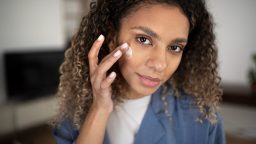Stress is an unavoidable part of life, but its impact on your body can often go unnoticed. While we may associate stress with mental and emotional strain, its physical toll can show up in many surprising ways—particularly on your skin and hair. Whether you’re dealing with work pressures, personal challenges, or even day-to-day life struggles, stress can trigger a range of skin and hair issues. Let’s take a closer look at how stress affects these areas and what you can do to mitigate its effects.
- Stress and Skin Breakouts
One of the most common and visible effects of stress on your skin is an increase in breakouts. When you’re stressed, your body produces more of the hormone cortisol. This hormone is linked to higher oil production in your skin, which can clog pores and lead to acne. Stress-related acne can appear anywhere on your face but is especially common on the forehead, chin, and jawline, areas often referred to as „hormonal acne zones.”
Not only can stress cause breakouts, but it can also make existing skin conditions, such as eczema or rosacea, worse. Stress weakens the skin’s natural barrier function, making it more susceptible to irritation, inflammation, and flare-ups. Reducing stress levels can help prevent these unwanted skin problems and promote a clearer, more balanced complexion.
- Stress and Dry Skin
Chronic stress can dehydrate your skin, leaving it dry and flaky. When you’re stressed, the body diverts water from your skin to other areas, leaving your skin’s moisture levels unbalanced. As a result, you may notice that your skin feels tighter or looks dull. Dry skin is often more prone to fine lines and wrinkles, as the lack of hydration can make the skin lose its elasticity.
To combat dry skin caused by stress, it’s essential to hydrate both internally and externally. Drinking plenty of water throughout the day is crucial, as well as using a rich moisturiser to lock in hydration. Look for products with ingredients like hyaluronic acid or ceramides, which help restore moisture and strengthen the skin’s barrier.
- Stress and Skin Ageing
Stress doesn’t just cause breakouts or dryness; it can also accelerate the skin’s natural ageing process. High cortisol levels have been linked to the breakdown of collagen, a protein that gives your skin its structure and firmness. When collagen production decreases, your skin loses its elasticity, which can lead to the development of wrinkles and sagging.
Additionally, stress can affect the repair process of the skin. During times of stress, the skin’s ability to regenerate and heal itself slows down, meaning that the damage caused by environmental factors such as UV exposure or pollution takes longer to repair. Over time, this can contribute to visible signs of ageing, including fine lines and uneven skin tone.
- Stress and Hair Thinning
Stress doesn’t only impact the skin; it can also wreak havoc on your hair. One of the most common effects of stress on hair is hair thinning or shedding. When you experience stress, your body goes into a “fight or flight” mode, which can disrupt the normal hair growth cycle. Stress can push a large number of hair follicles into a resting phase, known as telogen effluvium, which results in excessive shedding and thinning hair.
While hair thinning due to stress is typically temporary, it can still be alarming and frustrating. However, with proper care and stress management, hair can begin to regrow once the stress levels subside.
- Stress and Scalp Issues
Stress can also lead to scalp conditions like dandruff or psoriasis. It can trigger an overproduction of sebum (oil) on the scalp, leading to an imbalance that can cause flaking and irritation. On the other hand, stress can also cause dryness on the scalp, leading to itching and dandruff. This can be particularly bothersome, as the scalp can become sore or sensitive, affecting your overall hair health.
To manage stress-related scalp issues, it’s important to use soothing, hydrating hair care products. Look for shampoos and conditioners that are free from harsh chemicals and designed to balance the scalp’s moisture. Incorporating regular scalp massages into your routine can also promote circulation and help relieve stress-induced tension.
- Stress and Hair Loss
In more extreme cases, chronic stress can lead to a condition called alopecia areata, where the immune system mistakenly attacks the hair follicles, causing sudden hair loss in small patches. While this is a rarer occurrence, it highlights just how powerful stress can be in disrupting the hair growth cycle. If you notice significant hair loss during stressful periods, it’s important to seek medical advice to address the underlying cause and prevent further damage.
- Managing Stress for Better Skin and Hair
While it’s impossible to avoid stress entirely, managing it effectively can help reduce its negative impact on your skin and hair. Here are a few strategies to help keep stress at bay and promote healthier skin and hair:
- Practice mindfulness or meditation: Regular mindfulness practices can help lower stress hormones and improve your overall well-being. Meditation or breathing exercises can help you stay calm and focused throughout the day.
- Exercise regularly: Physical activity is one of the best ways to reduce stress. Exercise boosts endorphins, which are the body’s natural mood elevators, and also improves blood circulation, which benefits the skin and hair.
- Get enough sleep: Quality sleep is essential for both skin and hair health. During sleep, your body repairs and regenerates, so aim for 7-8 hours of restful sleep each night.
- Maintain a healthy diet: A balanced diet rich in antioxidants, vitamins, and minerals can support healthy skin and hair. Incorporating foods high in omega-3 fatty acids, like salmon and walnuts, can help combat inflammation and improve hair and skin texture.
Conclusion
Stress is more than just a mental burden; it can have a profound effect on your skin and hair. From breakouts and dryness to hair thinning and scalp issues, stress can manifest in many ways. However, by taking steps to manage your stress and adopting a healthy skincare and hair care routine, you can minimise these negative effects and promote a natural, radiant appearance. The key is to find balance and prioritise your well-being, both mentally and physically.





